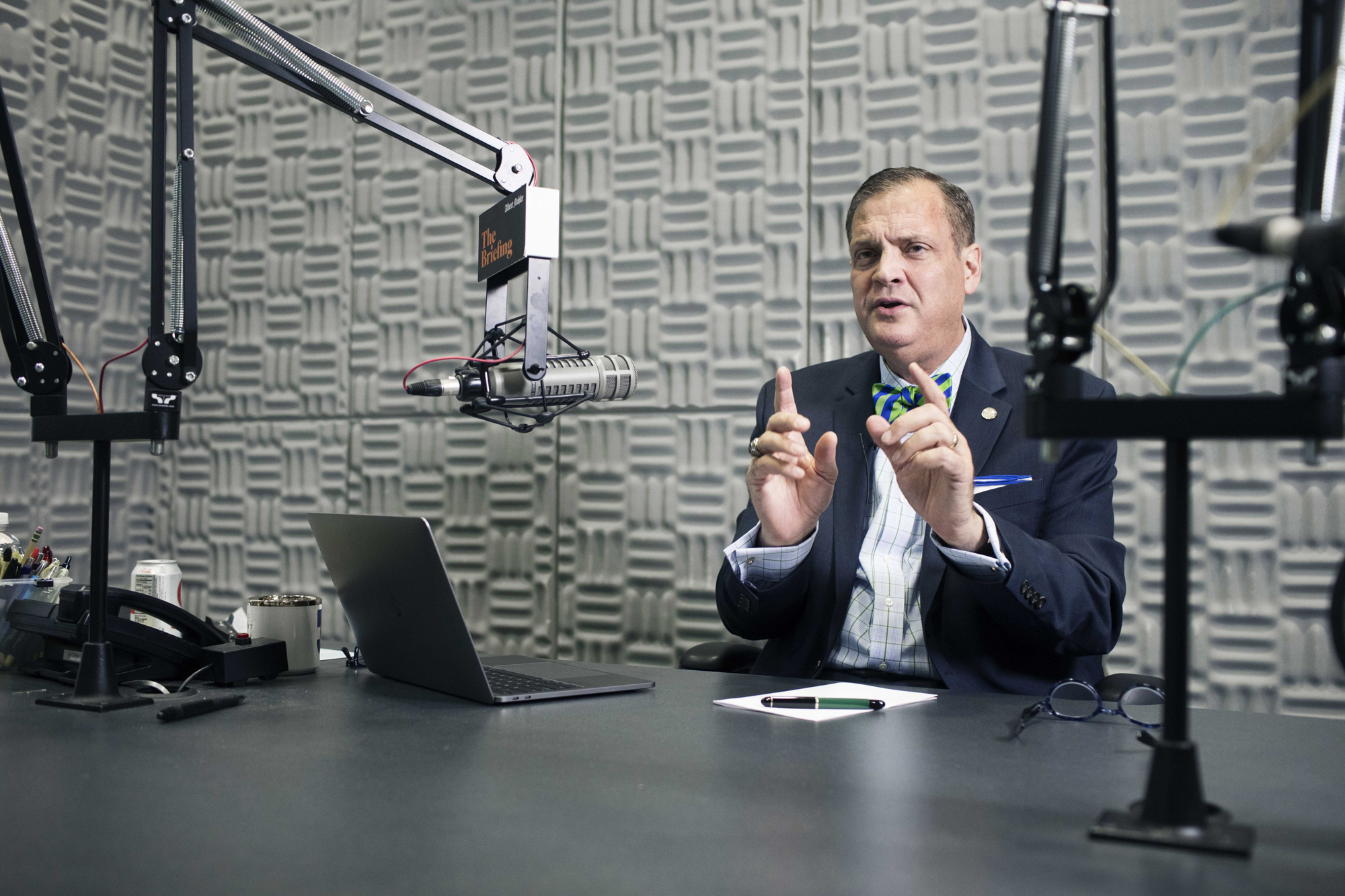
LOUSIVILLE, Ky. (BP) — He could just as likely be in Louisville, Ky., or somewhere in Germany. But no matter the time or place, setting up a recording studio in hotel rooms, or using his in-office studio, R. Albert Mohler Jr. records The Briefing five days a week.
And that reliability has paid off for the president of Southern Baptist Theological Seminary.
With its eighth season well underway, the daily podcast has reached a record number of listeners. Since he launched The Briefing in 2010, people have downloaded the podcast more than 27,028,453 times. And the show just completed today (Sept. 25) 1,621 episodes.
From the beginning, Mohler wanted to present cultural and religious issues in a way that benefits Christians as they strive to better understand the world around them. He believes The Briefing accomplishes this, in part, as he helps Christians navigate cultural questions from a biblical worldview.
“The radio program, the podcasts, and other media work I’ve done have seemed to be natural outworkings of the sense of calling and service to the church that I knew since the time I was a teenager,” Mohler said in a recent interview.
This “outworking of the sense of calling” allowed Mohler to work the last several years in various roles within evangelical circles, analyzing national and world events. The Briefing serves as a way believers can engage with cultural issues without hostility.
Before he started the podcast, he hosted The Albert Mohler Program, a nationally syndicated radio show aired each afternoon on Salem Radio.
Salem Radio Network is a United States-based network, featuring Christian talk shows, music, news programming and more. Salem Radio broadcasts more than 2,000 radio stations around the country, and hosts nine live, daily, and weekend talk shows, including the Eric Metaxas show and Lou Dobbs Financial Report.
Listeners tuned in at the same time every afternoon to hear commentary about cultural issues from a biblical perspective. The audience often called in with questions about politics, theology, church polity, cultural and ethical issues, and current events. Mohler addressed each question as many have come to know him: with honesty and from a Christian worldview, analyzing each question against Scripture and with charity toward difficult topics.
“My sense of calling from the very beginning, as a theologian and a pastor, has been to help Christians to understand the full implications of a worldview,” Mohler said. “The world in which we are now living throws an avalanche at us on a daily basis. I found with radio that I could deal with a number of issues on any given day with many other issues of equal importance simply being left behind.”
After nearly nine years, the daily routine of a live radio show did not work as well with scheduling and reaching a wider audience. As the show grew, so did the world of podcasts.
From news and cultural events to storytelling shows like This American Life with National Public Radio, the podcast movement expanded to include a wide variety of topics, outlets and hosts. The advancement of technology allowed for flexibility in recording and scheduling the show, and Mohler and his team realized a podcast created more freedom to plan and record on his own time.
“The more targeted we understood the podcast could be, we actually came to believe it could have a wider reach than live radio,” Mohler said. “With live radio, it was not just that I had to be behind the microphone at the same time every day, but that the listeners had to be by a radio as well. The podcast opened up an entire new universe of possibility.”
Even though he would miss the experience of live radio, the opportunity of hosting a podcast attracted Mohler. In fact, his love for radio drives his regular appearances on other programs and his ongoing Ask Anything Live broadcast, where listeners submit questions, giving the show a live radio feel.
Mohler believes one Christian responsibility is to work in secular professions, including areas like journalism, the marketplace and radio. When Christians engage these areas, he said, it presents an opportunity for passion and calling to merge with mission. However, the lack of influence in these spheres also can hurt the church.
“The Christian church is harmed when Christians, especially those who have ability and calling, do not enter those professions and exercise their gifts responsibly and faithfully,” he said.
Sending Christians into those fields with both a hardworking attitude and the truth of the Gospel is imperative, which is part of why he produces The Briefing. Mohler views secular fields as opportunity for the outworking of the Great Commission, in order “to be a light that otherwise would not be present,” he said. “A voice that otherwise would not be heard.”
Mohler’s goal for the podcast remains the same: To discuss news in a way that challenges Christians’ thinking and brings clarity to world events.
“This is not a part of some grand strategy to take over the digital world,” he said. “This is a strategy to try to help Christians to think through the issues of the day and to develop patterns and the discipline of thinking that are rigorously Christian and relentlessly biblical. I hope we get better and better over time. I hope that it is more useful. I hope that we learn over time the experience — how to be more helpful, more faithful in this.”
More information about The Briefing is available at albertmohler.com/thebriefing.
Go behind the scenes of The Briefing:
[YOUTUBE=P_bQsnMFZP8]














